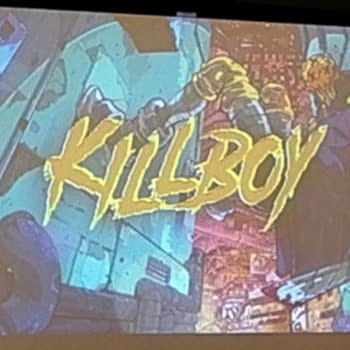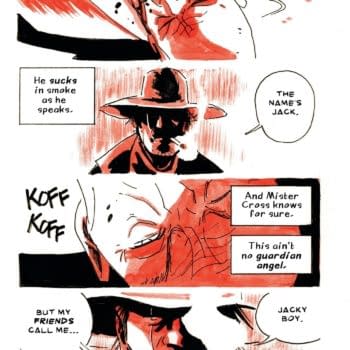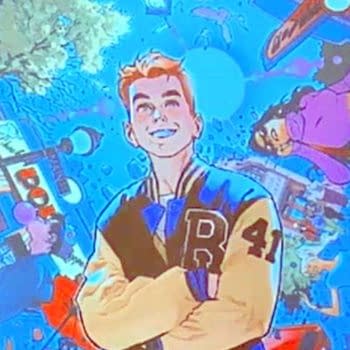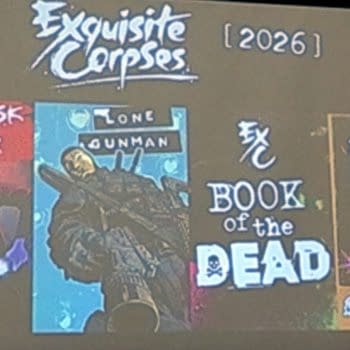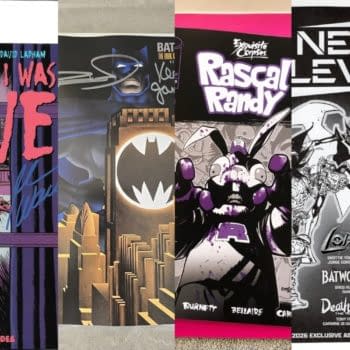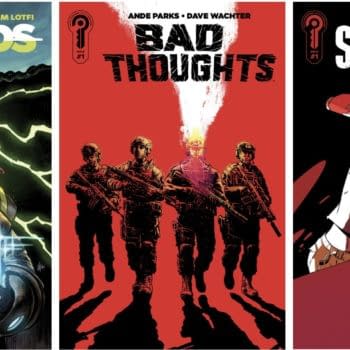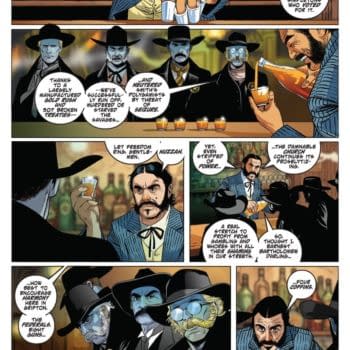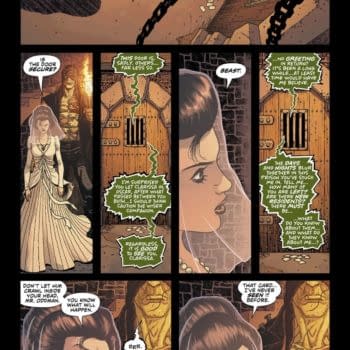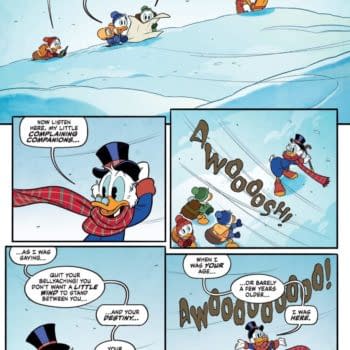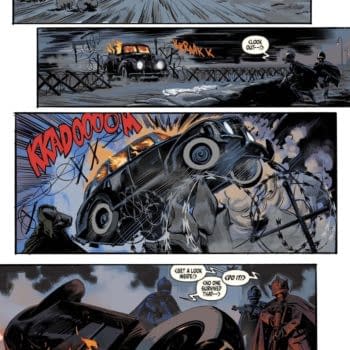Posted in: Comics | Tagged: Bryan k Vaughan, Comics, expo, image, jonathan hickman
Jonathan Hickman And Bryan K Vaughan Talk To Ryan King

Ryan King: Where to begin? You broke your way out with The Nightly News and you're doing all this amazing new stuff coming out with The Manhattan Projects soon. What are you most excited about with Image Comics and their anniversary and all these new creators coming aboard? What do you think?
Jonathan Hickman: Well, I'm a fan of comics so it makes me very happy to get to read new creator owned books by, not only creators I think do interesting work, but also guys that I know. Which has been one of the best things about being in comics is that I've gotten to know all the guys who make all the cool comics. I'm just so excited that Brian Vaughn has got a new book coming out. You know? I'm happy that Fatale is going great for Ed. I'm glad that the books that are succeeding are continuing to do so, like Chew and Walking Dead. For me personally, it's a very exciting time because I've done a lot of mini-series at Image but I've never done an ongoing book outside of Marvel. Yeah, I have a very short career compared to some of these other guys anyway. For me to be watching ongoings at Image and for orders to be as strong as they are and for people to be as excited about it, it's not just exciting. It's fulfilling.
RK: As far as breaking into the comics goes, I mean, I've read some of the introductions to some of your books, and do you consider yourself lucky making it this far into the industry?
JH: No. No. I think I've gotten opportunities. I've had some fortunate opportunities but lots of people get opportunities. Opportunity isn't rare. You know? You have to make the most of it. No, I don't consider it luck, I consider it that I had an opportunity and I put everything I had into it. I continue to do that on every project I that I work on, I feel like. How do you succeed? I think you work hard. So I reject the idea that it was purely fate, but I do like the romantic notion that it happened (laughs).
RK: With The Nightly News, have you gotten a lot of press out of that since it's mainly about press and a kind of retaliation against it?
JH: I've gotten a lot of interesting things that have happened because of it…
RK: Any crazy stories?
JH: I know journalism schools that have made their students read it.
RK: How do you feel about that?
JH: I don't care. I don't think it's going to make them do their job better (laughs).
RK: (Laughs) You are speaking to a journalist. Lay it on me, come on!
JH: Do you think that journalism is at its highest point in history? No! Absolutely not. Come on. But every job I got was because of The Nightly News. I haven't read it in a really long time; I don't even know if it holds up that well. I certainly appreciate what I got because of it and it was a lot of fun to do. As the exercise that it was, "Can you do a comic book?" It marries information, graphics, and narrative storytelling. Can you mix that into one thing? I still think it is a success in regards to that.
RK: How much research do you put into your work? Nightly News and Pax Romana include a lot of footnotes, a lot of factoids. Does that take you a long while? Is it a long process?
JH: I do a lot of research. I read a lot of tangential things that relate to the project that I'm working on and everything that I do. But, you know, with something like Fantastic Four, that just means I read a shit load of Fantastic Four. Right? Nightly News and Pax Romana, obviously they're different. If you look at something like Red Wing, which is a purely theoretical book,that's really nothing more than my entire lifetime reading science-fiction books or whatever ridiculous new scientific article pops on my rss feed or something like that. A lot goes into each one. The sourcing and all that kind of stuff is obviously radically different.
RK: Now speaking of your creative process, when it goes to coming up for an idea for a book, what is it like for you?
JH: I usually get everything all at once. The germ of what I want to do, it almost always, I get all of it at the same time. In a very, very short period of time. I don't really think about it too much, I don't try and break it down, I don't try to figure out why my head works that way. I do like the magical nature of that. I'm sure there's a very logical reason for why I put together information that way or why a story develops that way for me but I don't over think that.
RK: You're a writer as well as an artist—
JH: I guess people would consider me more of a writer over an artist now.
RK: Yeah, certainly. But does that have anything to do with your creative input?
JH: Well, I'm very visual in how I feel a story works. You know, in how things relate to one another. I put it together on a big piece of paper, or on the wall, or something like that. I'm not sure if that answers your question but yeah, visually I put it together that way.
RK: Moving on to Marvel's Fantastic Four, what can reader's expect from you and are you happy with what you've given them?
JH: Well, next month everything wraps up. The three year story I've been doing comes to an end. Well, I think I did a—well, I guess it depends on how you define it's succeeding. For Marvel, yeah I think it was unquestionably a success. I mean, we made it a best-seller again, we had people talking about the book. So from that point sure it was successful. But do I like it as a story? I think so. There is a lot of me in there. Probably a lot of me in that story than anything I've ever written. It's tough. I'm a terrible judge of my own work. I'm so hypercritical. But I found it validating.
RK: Did you ever imagine as a child that one day you would go on to write the Four?
JH: Well I didn't read Fantastic Four as a kid so that was one of the weird things about me getting the gig. Did I believe I would be working for Marvel—No!
RK: Where would you have placed yourself as a child? Did you want to become a firefighter or a policeman?
JH: No, no, no. I always wanted to do comics but I tried getting in after college and failed. I got sick of doing all the crap I did—"working." I tried again and succeeded. Five year old me would definitely high-five forty year old me.
RK: Final question. Do you have any words of wisdom or advice to creators out there aspiring straight out of college or on the streets trying to break out as an artist?
JH: Sure. I think you should number one, be good. Number two, only should only do something you would read. Not something you think other people would like to read. And then three, understand that you're in a competition and that means you have to outwork everybody else. It's definitely not just talent driven.
RK: Alright, great! Thank you so much for your time.
JH: Yeah, sure. Cool.

Ryan King: First and foremost, allow me to begin by saying a big thank you for returning to comic books after a small hiatus. With such an arsenal of topnotch work you've helped create, I believe many fans would agree with me in saying this medium just isn't the same without you. So thank you.
Brian K. Vaughan: That's very kind of you. Thank you!
RK: In less than a month your latest comic book script Saga, drawn by the talented Fiona Staples, will hit store shelves. As a writer well known for working with the top two comic book publishers (DC and Marvel), was there any reason you decided taking Saga to Image Comics, a publisher synonymous with creator-owned material?
BKV: Yeah, I just wanted to do a creator owned book, something that was really creator owned and I think that Image's creator owned contract is the most fair of anyone in comics. I love Marvel and DC. I've had a great time working there but it did feel like—I always describe Marvel and DC as my mom and dad who raised me and it felt like I've been living with mom and dad so long that I should try and move out. So Image is kind of the equivalent of sort of going away to college, where I think there is a little structure and a little help but a lot more freedom and responsibility. So yeah, I was ready to graduate to Image it felt like.
RK: Saga is often compared as your attempt at a Star Wars-like story. I don't know about you, but the last time I saw a Star Wars film it was not rated 'R,' unless Lucas changed a few things in the 3D versions… Considering Saga is advised for mature readers, what kind of disturbing content do you plan on unleashing into the world? Surely it has nothing to do with Dave Dorman's complaints on breastfeeding?
BKV: There is some disturbing stuff in here, I'm proud to say. Yeah, I sent the fourth script to Fiona awhile back with like an apology at the beginning like, 'This is a weird dark one.' I had a lot of freedom at Vertigo but even more at Image, where there is no one looking over our shoulder, there are no restrictions at all. I also felt sort of a responsibility now that I have kids. I think filmmakers and artists change after they have kids. You know? You start realizing you have a responsibility to the world, I think your work changes and you start doing stuff that's more family friendly and I sort of wanted to go in the opposite direction and force myself to write this filthiest, most violent, sexually perverse thing in the world. So, uh, that's Saga. Be on the look out!
RK: Would you mind elaborating on your process as a writer creating a comic book? Once you have a finished script, do you merely choose an artist at random? How did you strike upon Staples for Saga? Or Tony Harris for Ex Machina? What kind of artistic qualities do you look for?
BKV: It's different each time. But I usually don't write script until I know who the artist is. With Saga, I had an idea that I wanted to do this fantasy/sci-fi epic but I wasn't sure who was going to draw it. But when I saw Fiona's stuff, I was like, 'Oh, I get it. I can sort of see what this book is going to be. As soon as I saw her stuff, I thought she would be awesome for this book. You know? It's not much more complex than that. I think it's just sort of trusting that maybe this is going to work. It's not that hard to describe. All I know is that it paid off huge. Like as soon as Fiona's pages started coming in, it was like the first time I saw the first Pia pages, the first Tony Harris pages, the first Adrian Alphona Runaways' pages. I felt we're going to have a long partnership together. She just works great. I'm very excited.
RK: There is no doubt you are considered one of the literary staples in the comic world. For those aspiring comic creators out there, do you have any words of wisdom? Any foolish mistakes you hope no amateur creators repeat in your footsteps?
BKV: No. I think just make comics. Like when I broke in this sort of stone age there really wasn't this internet community that there was now. It was sort of Marvel and DC, and you know, maybe a couple other places were the only games in town. If I were breaking in now, I would just be publishing straight to the web, I think, and just finding an artist online and putting stuff out there. And not sort of waiting for permission for someone else to publish my stuff. Same thing now, if you want to make comics you need no advice, you need no excuse, you just need the sort of dedication to go do it. So stop thinking about it and go make comics.
RK: Back in November of last year, news spread that you signed on to adapt Stephen King's novel Under the Dome for a Steven Spielberg-produced Showtime adaptation. What caused you to climb aboard this expedition and return back to the high seas of television since you're last adventure on Lost? Did it have anything to do with King making a pop-culture reference to you in the book?
BKV: I would be lying if I said I didn't. I just thought it would be so cool to go on this journey. Stephen King was just such a huge influence for me growing up. You know? It was a real rite of passage that my dad read every Stephen King book when I was a kid. He was like, 'Okay, you can finally read Eyes of the Dragon, like that'll be your introduction and if you can handle this—' And I was like, 'NO! I want Misery! I want Misery!' So yeah, Stephen King has been a huge part of my life and then the fact that he has come to like some of my comics and then to name check me in a book, which is so bizarre, and a book that I really loved. I just really love Under the Dome. Yeah, I just really saw a lot of potential there and the fact that Showtime wants to do it as an ongoing series, not just as a limited series. So I'm not just going to be translating the book, I have an opportunity to do something new with all these great characters. So, it's really early in the process and there's plenty of time for stuff to go wrong but right now it's been great.
RK: Yeah, that kind of into my next question. I was going to ask if it was going to be an ongoing series or if it was going to be one of those old movie adaptations straight for the television screen.
BKV: Yeah, the goal is an ongoing series.
RK: How faithful do you imagine the adaptation of Under the Dome being in comparison to the original source material? Is there anything you or the executives over at DreamWorks personally wish to change?
BKV: I guess that's where I would probably have to plead the fifth. It's early in the process so I guess I can't reveal too much more that the sausage is being made. But it's being made and it's pretty tasty.
RK: Do you have any favorites of Stephen King's?
BKV: Yeah! Um… Man, this is hard. I guess, uh, The Shining. It's hard not to say that. But maybe Misery. I guess just especially as a writer. Yeah, really reading that book I distinctly remember a line of that book where Stephen King is describing Cyndi Lauper hiccupping through a song and as just a reader, I was like, 'That is what Cyndi Lauper does. She does hiccup really with her songs.' He is sort of using this pop culture in his mastery of the language. And yeah, I fell in love with writing. So yeah maybe, Misery and Shining tie, I guess.
RK: Going back to the aforementioned adaptation, is there any chance that one of your own works will be adapted for the big or small screen? I personally would love to see Ex Machina or Y: The Last Man on the Hollywood circuit. Any chance?
BKV: Sure, there's always a chance. They're all in sort of various levels of development hell at the moment. But for me, comics were always the sort of end destination. It was never like I wanted to do comics to get them turned into movies. I'm always interested to know if something will happen to them and whatever I can do to help. But for me, the comics were the destination. Everything else was just gravy.
RK: Thank you again, Brian. I very much appreciate it and look forward to reading Saga.
BKV:Yeah, March 14th. Thank you so much, man.






